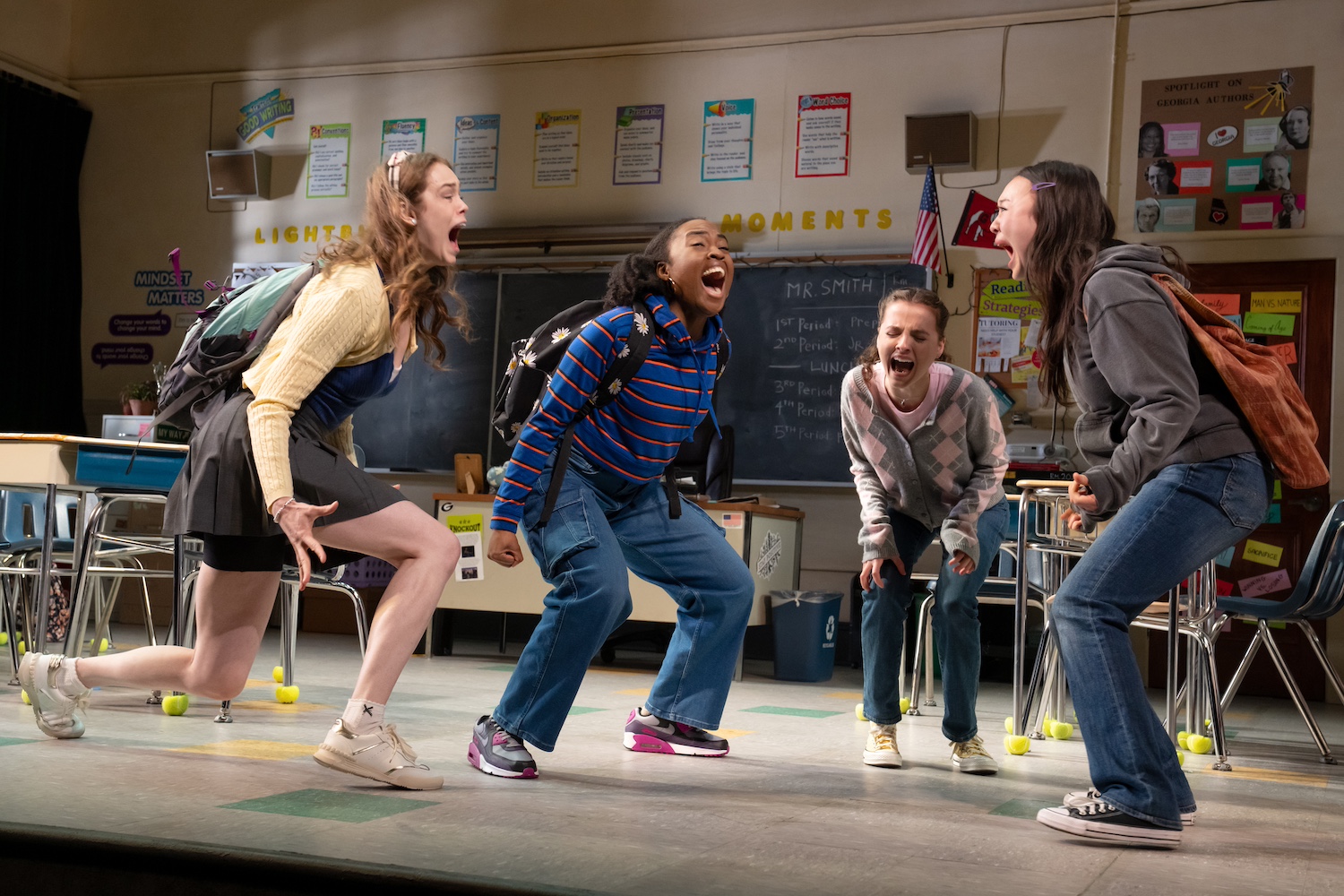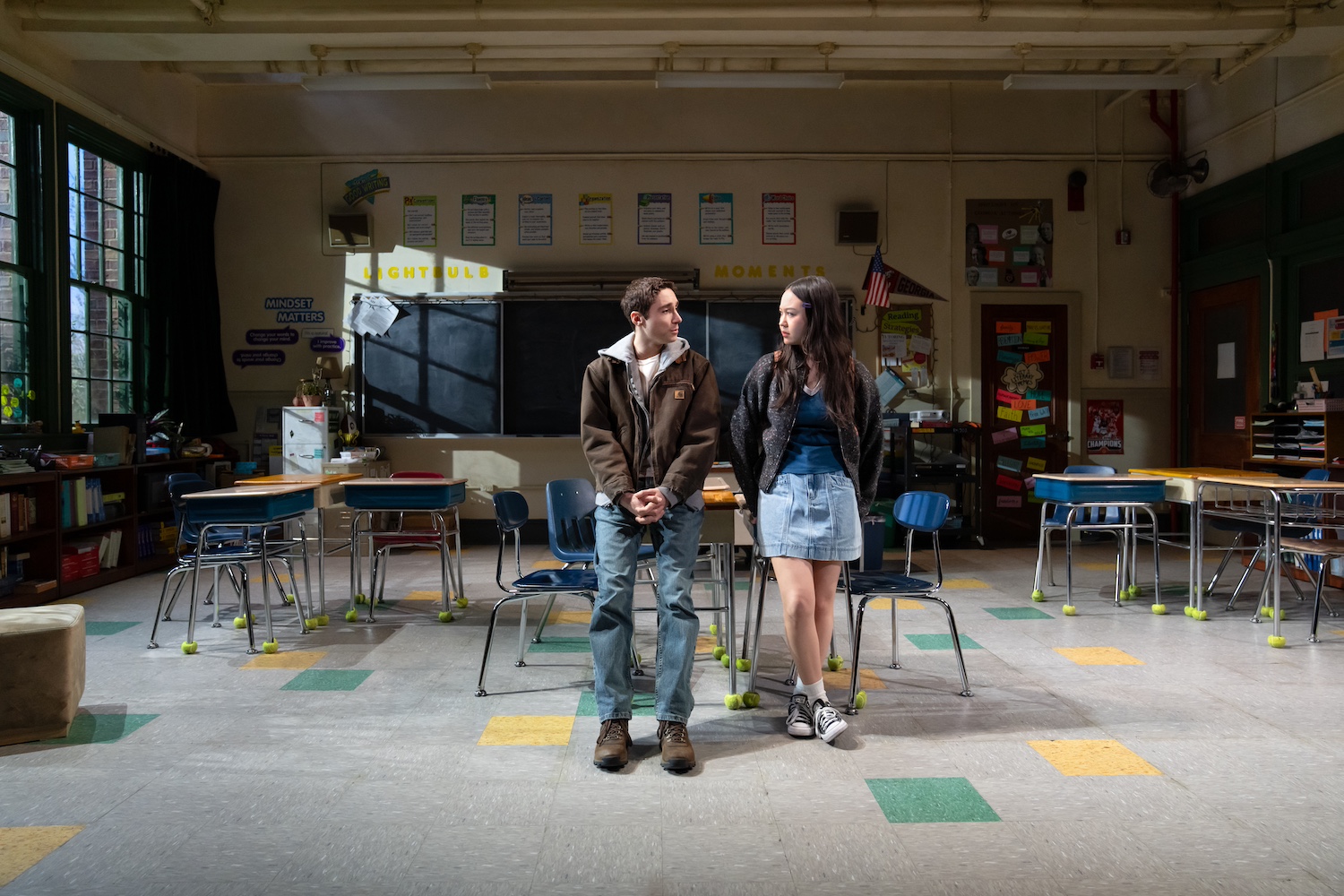**½ /***** (two and a half stars out of five)
There’s a point late in Kimberly Belflower’s John Proctor is the Villain—now in its Broadway debut at the Booth Theatre—when four high school girls engage in a sort of primal scream, their proverbial cups having runneth over. Never before have I wished a play was interactive, so that I might have joined their wails. Unfortunately, it wasn’t out of empathy, but rather frustration with the spectacle I’d witnessed up to that point.
Somewhere in John Proctor is the Villain’s script is the germ of a compelling story, but unfortunately it never shows up on stage. Instead, it gets lost in the threads of too many other stories that are simply left hanging. It feels like it would be more at home as a Lifetime network series than in a theater. The story, set in a rural Georgia high school classroom where the multi-tasking teacher, Mr. Smith (Tony winner Gabriel Ebert, who does the earnest high school teacher quite well), is not only teaching The Crucible to his English class, in an embarrassing bit of foreshadowing, but sponsoring an after school “feminist” club—whose goal is to “spread awareness, foster dialogue, and ignite change’’—at the behest of his neurotic, “study buddy” student, Beth (Fina Strazza, who gives the only compelling, nuanced performance of the play). The club is mostly attended by other female students who are drawn by its irreverence in their close-knit, conservative community, plus a bored, dim male student looking for “extra credit.”

Crammed into the play’s intermission-less two hours are accusations of infidelity, boyfriend-stealing, allusions to a student’s mental health breakdown, and an accusation (possibly true) of an inappropriate relationship between a teacher and a student (like—guess what!—in the play they’re reading). All these sundry scandals were seemingly ignited by the revelation that one student’s father had an affair with his secretary, as if this was something utterly scandalous and unheard of in this slice of smalltown America. More disturbing, really, is the compelling, but quickly dropped storyline of a young woman being controlled and intimidated by her longtime (since fourth grade!) boyfriend. One worries for her safety and emotional well being, yet we never get any resolution because the play moves on to the more salacious and speculative relationship (student/teacher) despite its seemingly weak foundation.
Director Danya Taymor seems to be the current go-to for Gen-Z melodramas, like last year’s shallow Tony-winner, The Outsiders. But here she’s stuck with dialog that sounds better suited to a Valley Girl than an empowered rural teen. Belflower’s dialog, often clipped and interrupted, comes across as undeveloped and often wasteful, frequently failing to neither move the story forward nor contribute meaningful nuance. Instead, it’s largely expository and often dwells in uninspiring teen banter, such as this gem, uttered by Raelynn (Amalia Yoo, one-dimensional) as she contemplates sex:
“Yeah! Yeah, of course, yes, but I, I mean yeah! It’s just, it’s complicated.”
Only occasionally do we get the impression these teens have compelling inner lives—most of the time they come across as simple and uninteresting. Belflower not only fails to develop plot points, but characters as well.

The production has been propped up by the stunt casting of Sadie Sink—inspired, no doubt, by her starring role in Netflix’s wildly popular drama series, “Stranger Things”—who looks nearly ten years older than the role (clearly modeled on Lindsay Lohan’s terrific performance in Mean Girls) she’s playing. Her character, first whispered about before we see her, is the play’s most pivotal, and one whose transformation—which was almost compelling—comes seemingly out of nowhere. A slow build to her emotional unravelling would have been far more impactful.
Countless productions have cleverly and expertly explored dramatic teen dynamics—notably, Kimberly Akimbo, Dear Evan Hansen and Be More Chill—and succeeded at revealing emotionally profound characters, but John Proctor is the Villain doesn’t manage to bring its characters to life the way those other plays did. And when the play ends in an anger-fueled dance-off to pop-star Lorde’s song “Green Light,” the anti-climax is complete. Their frenzied outburst is at odds with the song’s tepid simplicity, which is symptomatic of contemporary pop. This group of supposed Gen Z (or Gen Alpha) feminists would have been better served by a white hot, rageful 90s riotgrrl band like Veruca Salt or Hole. And that’s the play’s downfall. Ultimately, John Proctor is the Villain wants to be too many things . . . and it sadly never succeeds at any of them.
John Proctor is the Villain. Through July 6 at the Booth Theatre (222 West 45th Street, between Broadway and Eighth Avenue).












